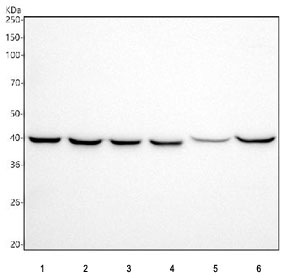- Tel: 858.663.9055
 Email: info@nsjbio.com
Email: info@nsjbio.com
- Tel: 858.663.9055
- Email: info@nsjbio.com
ACAT1 Antibody reagents target acetyl-CoA acetyltransferase 1 (ACAT1), also known as mitochondrial acetoacetyl-CoA thiolase, a pivotal enzyme in energy metabolism and ketone body regulation. ACAT1 catalyzes the reversible condensation of two acetyl-CoA molecules to form acetoacetyl-CoA, a key intermediate in ketogenesis, fatty acid oxidation, and cholesterol metabolism.
ACAT1 is highly expressed in mitochondria-rich tissues such as liver, heart, kidney, and skeletal muscle, where it helps regulate energy supply during fasting, exercise, and nutrient stress. Beyond its classic metabolic roles, ACAT1 has been implicated in cancer metabolism, immune cell regulation, and neurodegenerative disease.
Genetic mutations in ACAT1 cause beta-ketothiolase deficiency, a rare inherited metabolic disorder characterized by episodic ketoacidosis, developmental delay, and neurological symptoms. Because of its broad importance, the ACAT1 Antibody is indispensable for research into metabolic pathways, inherited disorders, oncology, and translational pipelines. The Acetyl-CoA Acetyltransferase Antibody complements these studies by ensuring reproducible detection across diverse assay platforms.
NSJ Bioreagents provides ACAT1 Antibodies validated for immunohistochemistry (IHC), western blotting (WB), immunofluorescence (IF), flow cytometry (FACS), and ELISA. Each antibody undergoes rigorous validation for specificity, reproducibility, and assay compatibility.
Key benefits include:
Metabolic Specificity: Targets a mitochondrial enzyme central to ketone and lipid metabolism.
Cross-Platform Validation: Works across tissue sections, cultured cells, and biochemical assays.
Reproducibility: Batch-to-batch consistency ensures reliable long-term research.
Comprehensive Support: Datasheets include protocols, controls, and validation images.
Translational Value: Suitable for biomarker-driven studies and clinical pipelines.
By choosing NSJ Bioreagents, researchers ensure that the ACAT1 Antibody delivers robust, reproducible results across metabolic and translational biology.
The ACAT1 Antibody supports broad applications in metabolism, disease modeling, and clinical translation.
Detect ACAT1 expression in hepatocytes and other metabolic tissues.
Support studies of ketone body synthesis during fasting or ketogenic diets.
Provide biomarkers for energy balance under nutrient stress.
Extend into translational metabolism and nutritional research.
ACAT1 Antibody detects enzyme activity in mitochondrial fatty acid oxidation.
Supports studies of acetyl-CoA flux and lipid turnover.
Provides biomarkers for lipid metabolic disorders.
Extends into translational research on obesity and diabetes.
Detect ACAT1’s contribution to cholesterol balance and steroid precursors.
Support research into dyslipidemia and cardiovascular disease.
Provide biomarkers for metabolic syndrome.
Extend into translational endocrinology and cardiology.
ACAT1 Antibody detects loss-of-function mutations linked to beta-ketothiolase deficiency.
Supports functional studies of enzyme deficiency in patient-derived models.
Provides biomarkers for diagnostics and genetic counseling.
Extends into translational rare disease research.
Detect altered ACAT1 expression in tumor cells with high metabolic demand.
Support studies of metabolic reprogramming in cancer progression.
Provide biomarkers for therapeutic targeting of tumor metabolism.
Extend into translational oncology pipelines.
ACAT1 expression links ketone body metabolism to brain energy supply.
Antibodies support research into epilepsy, Alzheimer’s disease, and Parkinson’s disease.
Provide biomarkers for translational neuroscience.
Extend into therapeutic pipelines exploring metabolic therapies for brain health.
ACAT1 Antibody detects expression in immune cells such as macrophages.
Supports studies of how metabolism regulates immune responses.
Provides biomarkers for immunometabolic disorders.
Extends into translational immunology research.
ACAT1 is a potential therapeutic target for cancer and metabolic syndromes.
Antibodies validate pharmacological inhibition in preclinical models.
Provide biomarkers for drug efficacy and safety testing.
Extend into pharmaceutical research and development.
ACAT1 Antibody supports biomarker studies in metabolic disease, cancer, and rare disorders.
Provides reproducibility in clinical assay development.
Bridges discovery with translational pipelines for diagnostics and therapy.
Ensures reliability across laboratory and clinical applications.
ACAT1 is a mitochondrial enzyme that integrates lipid metabolism, ketogenesis, and cholesterol regulation. The ACAT1 Antibody provides researchers with validated tools for probing its roles in physiology and pathology.
In metabolic research, it clarifies ACAT1’s contribution to ketone body synthesis and lipid turnover. In oncology, it highlights altered metabolic pathways fueling tumor growth. In rare disease research, it supports studies of beta-ketothiolase deficiency. In neuroscience, it reveals how ketone metabolism influences brain health.
Clinically, ACAT1 is a biomarker and potential therapeutic target across rare metabolic disorders, cancer, cardiovascular disease, and neurodegeneration. Reliable Acetyl-CoA Acetyltransferase Antibody reagents ensure reproducibility and translational value in both laboratory and clinical pipelines.
ACAT1 is a critical mitochondrial enzyme that governs ketogenesis, fatty acid metabolism, and cholesterol regulation. The ACAT1 Antibody provides validated tools for metabolic biology, rare inherited disorders, oncology, and translational pipelines, while the Acetyl-CoA Acetyltransferase Antibody complements these applications across assay platforms. By ensuring specificity, reproducibility, and assay versatility, these antibodies remain indispensable for advancing energy metabolism research and improving clinical outcomes.

Western blot testing of 1) human HepG2, 2) human Caco-2, 3) human PC-3, 4) human K562, 5) rat lung and 6) rat liver tissue lysate with ACAT1 antibody (Cat # RQ8786). Predicted molecular weight ~45 kDa.
|
| ||

|
|
| ||

|
|
| ||

|